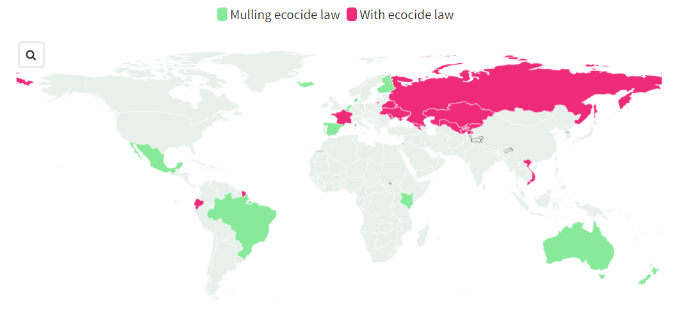Context:
The Tribunal for the Rights of Nature called Mexico’s Maya train project responsible for causing “crimes of ecocide and ethnocide”.
About Ecocide:
- The term ‘Ecocide’ is derived from Greek and Latin, translates to ‘killing one’s home’ or ‘environment’.
- Ecocide is the “unlawful or wanton acts committed with knowledge that there is a substantial likelihood of severe and either widespread or long-term damage to the environment being caused by those acts.”
Genocide
- Genocide is an internationally recognized crime where acts are committed with the intent to destroy, in whole or in part, a national, ethnic, racial, or religious group.
|
Global Standing on Ecocide Laws:
- Ecocide is a crime in 11 countries, with 27 other nations deliberating laws around criminalizing environmental damage.
- The European Parliament voted unanimously this year to enshrine ecocide in law.
- Mexico recently proposed a Bill to criminalize any “unlawful or wanton act committed with the knowledge that there is a substantial likelihood of severe and either widespread or long-term damage to the environment”.

Importance of Ecocide Laws:
- Act as legal instruments to plug a lacuna in environmental protection.
- Ecocide laws could double as clarion calls for justice for low- and middle-income countries disproportionately shouldering the impact of extreme weather.
- For Example: Small nation-states like Vanuatu and Barbuda are lobbying for the ICC to declare crimes against the environment as violations of international law.
- Ecocide laws are a crucial aspect of the larger effort to shift public awareness, acknowledging our interdependence with the environment and the need to employ political, diplomatic, and legal tools for environmental protection.
What has been India’s stance?
- In Chandra CFS and Terminal Operators Pvt. Ltd. v. The Commissioner of Customs and Ors: The Madras High Court noted, “the prohibitory activities of ecocide have been continuing unbridledly by certain sections of people by removing the valuable and precious timbers.”
- T.N. Godavarman Thirumulpad vs Union Of India & Ors case: Supreme Court called attention to an “anthropogenic bias” and argued that “environmental justice could be achieved only if we drift away from the principle of anthropocentric to ecocentric.”
News Source: The Hindu
![]() 6 Sep 2023
6 Sep 2023
